Titan most often refers to:

Master of Orion is a turn-based, 4X science fiction strategy game in which the player leads one of ten races to dominate the galaxy through a combination of diplomacy and conquest while developing technology, exploring and colonizing star systems.

Netrek is an Internet game for up to 16 players, written almost entirely in cross-platform open-source software. It combines features of multi-directional shooters and team-based real-time strategy games. Players attempt to disable or destroy their opponents' ships in real-time combat, while taking over enemy planets by bombing them and dropping off armies they pick up on friendly planets. The goal of the game is to capture all the opposing team's planets.

Wing Commander is a media franchise consisting of space combat simulation video games from Origin Systems, Inc., an animated television series, a feature film, a collectible card game, a series of novels, and action figures. The franchise originated in 1990 with the release of video game Wing Commander.
The concept of Self-replicating spacecraft, as envisioned by mathematician John von Neumann, has been described by futurists including physicist Michio Kaku and discussed across a wide breadth of hard science fiction novels and stories. Self-replicating probes are sometimes referred to as von Neumann probes. Self-replicating spacecraft would in some ways either mimic or echo the features of living organisms or viruses.
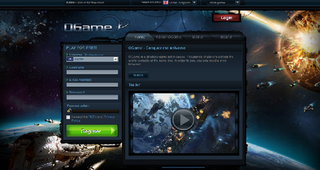
OGame is a browser-based, money-management and space-war themed massively multiplayer online browser game with over two million accounts. OGame was created in 2002 and is produced and maintained by Gameforge. OGame is available in multiple languages, and different nationalities have their own communities. The game does not differ between the nationality communities except in rare cases. Players are generally informed of news, rule changes, or new versions through the official forums.
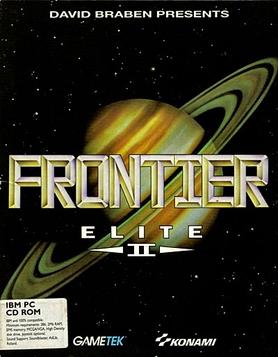
Frontier: Elite II is a space trading and combat simulator video game written by David Braben and published by GameTek and Konami in October 1993 and released on the Amiga, Atari ST and DOS. It is the first sequel to the seminal game Elite from 1984.

Spelljammer: Pirates of Realmspace is a video game for MS-DOS released by Strategic Simulations in 1992. It is a Dungeons & Dragons PC video game using the Advanced Dungeons & Dragons, Second Edition rules, and the Spelljammer setting. Spelljammer was programmed and designed by Cybertech Systems.

Master of Orion II: Battle at Antares is a 4X turn-based strategy game set in space, designed by Steve Barcia and Ken Burd, and developed by Simtex, who developed its predecessor Master of Orion and Master of Magic. The PC version was published by MicroProse in 1996, and the Macintosh version a year later by MacSoft, in partnership with MicroProse. The game has retained a large fan base, and is still played online.

Project Firestart is a cinematic survival horror game for the Commodore 64 computer system. It was designed by Jeff Tunnell and Damon Slye and published by Electronic Arts in 1989. Taking place in the 21st century, the game follows a government agent dispatched to a research station in orbit around Saturn's moon, Titan, to learn why the scientists there abruptly cut off communication with Earth. The game has been cited by various gaming journalists and writers as one of, if not the first, survival horror game, pioneering many conventions of the genre including limited ammunition, an emphasis on escaping enemies and puzzle solving over combat, solving a central mystery, and multiple endings.

Mars Saga is a role-playing video game developed by Westwood Associates and published by Electronic Arts for the Commodore 64 in 1988. Following a legal battle against Electronic Arts for rights on the franchise, Westwood turned to Infocom to publish the Apple II and MS-DOS ports.
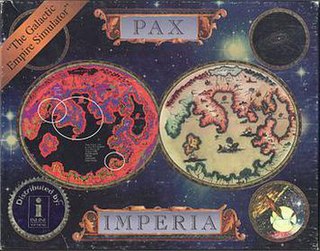
Pax Imperia is a 4X game for the Apple Macintosh, released in 1992. The game won praise for its complex gameplay, real-time mode and ability for up to 16 players to join a single game using AppleTalk.
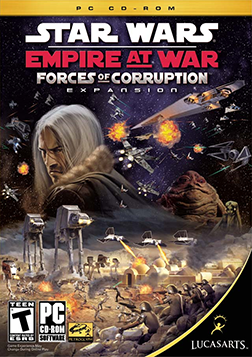
Star Wars: Empire at War: Forces of Corruption is an expansion pack for the computer game Star Wars: Empire at War released in October 2006. It adds the "Zann Consortium" as a third faction in addition to a number of new features.

Sins of a Solar Empire is a 2008 science fiction real-time strategy video game developed by Ironclad Games and published by Stardock Entertainment for Microsoft Windows operating systems. It is a real-time strategy (RTS) game that incorporates some elements from 4X games; its makers describe it as "RT4X". Players are given control of a spacefaring empire in the distant future, and are tasked with conquering star systems using military, economic and diplomatic means.

Haegemonia: Legions of Iron, or Hegemonia: Legions of Iron, is a 3D real-time strategy game developed by Digital Reality for Microsoft Windows, and by Microïds for iOS.
Empire is the name of a computer game written for the PLATO system in 1973. It is significant for being quite probably the first networked multiplayer arena shooter-style game. It may also be the first networked multiplayer action game.

Warhammer 40,000: Dawn of War – Dark Crusade is the second expansion to the real-time strategy video game Warhammer 40,000: Dawn of War developed by Relic Entertainment and published by THQ. Based on Games Workshop's tabletop wargame, Warhammer 40,000, Dark Crusade was released on October 9, 2006. The expansion features two new races, the Tau Empire and the Necrons. Including the Imperial Guard from Dawn of War's first expansion pack Winter Assault, a total of seven playable races in this expansion.
Star Sonata is a space-themed massively multiplayer online role-playing game (MMO) by American studio Star Sonata LLC released in 2004 that combines elements of action games and real-time strategy games such as real-time ship-to-ship combat and galactic conquest.
A self-replicating machine is a type of autonomous robot that is capable of reproducing itself autonomously using raw materials found in the environment, thus exhibiting self-replication in a way analogous to that found in nature. Such machines are often featured in works of science fiction.
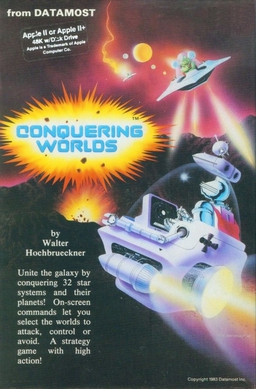
Conquering Worlds is a 1983 video game published by Datamost.














